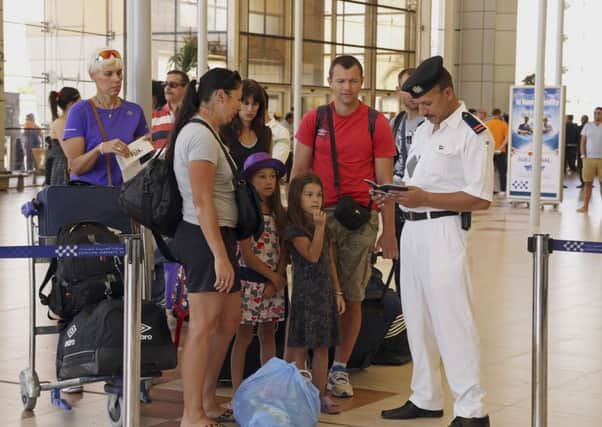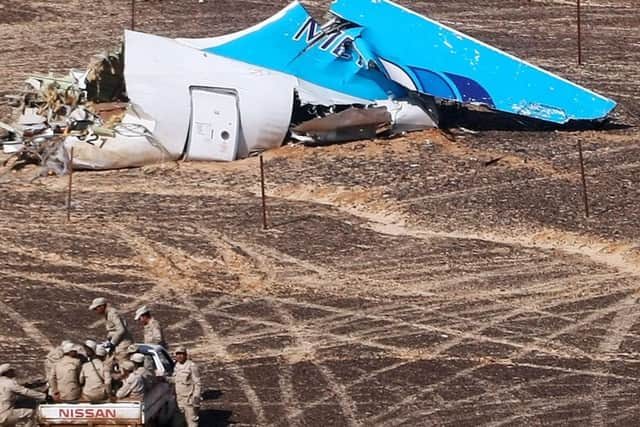Russian plane crash: What impact will it have on air travel?


With its golden, sun-drenched beaches and inviting turquoise seas, Sharm el-Sheikh has become a top destination for British holidaymakers.
Especially at this time of year with the dark nights drawing in, the coastal strip along Egypt’s Sinai peninsula is a popular choice with those seeking a dose of winter sun.
Advertisement
Hide AdAdvertisement
Hide AdBut the recent Russian plane crash, which killed all 224 people on board, has cast a shadow over this blissful image.


The investigation into what caused a plane full of holiday-makers to plunge from the sky is still on going, but there is a growing belief that a noise picked up by the cockpit voice recorder in the final seconds of the flight, bound for St Petersburg, was the sound of an explosion caused by a bomb.
The British Government was quick to ground all flights between the UK and the Egyptian resort and despite initial criticism from some quarters several other countries have since followed suit.
More than 5,000 holidaymakers have returned home since Friday, when flights restarted, but thousands of Britons remain stranded in Sharm el-Sheikh, with tour operators and airlines expected to cover the costs of extended stays.
Advertisement
Hide AdAdvertisement
Hide AdSome tourists returning home described chaotic scenes as people rushed for planes while swamped security staff carried out only cursory checks. Others said security at the airport had been ramped up significantly, with armed guards on checkpoints outside the main terminal building and three further security checks inside.
Once everyone is back home safely there are key issues that need to be addressed. Speaking at the weekend, Foreign Secretary Philip Hammond warned that airport security around the world would have to be overhauled if it was confirmed that the crash in the Sinai was caused by an Islamic State (IS) bomb.
There are basically two ways a bomb can be smuggled on board a plane – either by passengers or staff, including air crews and baggage handlers.
Following 9/11, a number of measures were introduced including preventing passengers from accessing the cockpit. But in the UK it was the 1988 Lockerbie bombing, in which 270 people died when a bomb exploded on a Pan Am flight from Heathrow to New York, that led to change.
Advertisement
Hide AdAdvertisement
Hide AdSince the early 1990s all workers are required to be screened when they enter a secure area, a rule which the European Union adopted in 2004.
However, not everywhere has the same stringent security checks in place. Global airport security is supposed to meet agreed standards and is regulated by the International Civil Aviation Organization (ICAO). But in practice, there are can be big differences.
There are some airlines that impose their own security-vetting procedures at overseas airports, over and above whatever is done locally. But equally there are some parts of the world where airports fall short.
The Russian airline crash raises questions about the effectiveness of airport security procedures, particularly in areas where terrorist groups might be active.
Advertisement
Hide AdAdvertisement
Hide AdBut if security is to be beefed up in any country where so-called Islamic State operates – that will be both expensive for airlines and time-consuming for passengers – although it may well be necessary.
In the past, terrorist organisations tended to operate in specific parts of the world which made them easier to monitor, if not eradicate. The problem now, though, is that terrorist groups are spreading into new territories, including some places close to popular tourist trails.
Thankfully, very few terrorist attacks on airlines have been successful, but on the rare occasions they do succeed they strike fear into the general public.
Each one also raises the vexed question of whether a security lapse was to blame, or something more sinister. It’s a question that has once again been thrust into the spotlight amid renewed concerns about the safety of air travel.
Advertisement
Hide AdAdvertisement
Hide AdDr Anil Padhra, senior lecturer in aviation studies at Kingston University London, points out that a number of people need to have access to a passenger plane. “The moment an aircraft arrives at an airport there are several groups of people who have access to it, there’s the maintenance crew, baggage handlers, catering staff and people to clean out the waste tanks,” he says.
Airport staff around the world undergo vetting procedures, although there are question marks over how vigorous this is in some instances.
Bur Dr Padhra believes there are additional measures that could be looked at. “You could have fewer people with access to the aircraft, although this would mean passengers would have to wait longer in the terminal,” he says.
Another option could be to introduce additional security checks, but this again will take more time and cost money, with the airlines presumably having to foot the bill.
Advertisement
Hide AdAdvertisement
Hide Ad“This would create another layer of safety and in some respects it already happens because people with pushchairs or buggies can take them to the gate before they get checked and placed in the hold.
“You could add points in the process where you can get checked, although that doesn’t in itself solve the problem of access to the plane.
“But once the aircraft has been loaded a device could be used to scan the cabin and cargo hold to make sure everything is as it should be.”
Another option could be to reduce the time between bags being checked and loaded onto the aircraft. “Passengers could be asked to keep hold of their luggage until they reached the gate and then have them checked, this would reduce the opportunity for something sinister to happen.”
Advertisement
Hide AdAdvertisement
Hide AdOne of the key concerns, though, is the differing levels of airport security depending on where you are in the world.
Dr Padhra says when he was in Dubai he went through three security checks, once on entering the airport terminal, again at passport control and had his bags checked a third time before he was allowed to board the plane, but he says this wasn’t the case at Sharm el-Sheikh recently. “I was there a month ago and I had only one check at immigration.”
Despite such concerns most experts insist that air travel has never been safer, especially if you look at the number of crashes and fatalities compared to the huge number of people flying (last year passenger numbers topped 3.2 billion).
However, unless all airports around the world have a similar level of security, it raises the question of just how safe it will be to fly in the future?
Advertisement
Hide AdAdvertisement
Hide AdDr Padhra believes the ramifications of the crash in Egypt could prove to be far-reaching. “This particular incident is a game-changer because if people don’t feel safe they won’t fly. Airlines will continue to operate certain routes but if they don’t sell seats they will pull out and go elsewhere in the world where it’s safer,” he says.
“Airlines will review their security procedures and may stop flying to some places if they have concerns and the local airport authorities will have to ramp up security.”
It’s not just tourist destinations that could be affected, it might mean that air travel takes longer for all of us.
“In the past airports have tried to make it as efficient as possible, but passengers may have to wait longer in the future if some of these changes take place.”
Perhaps that is the price we all must pay to ensure our safety.